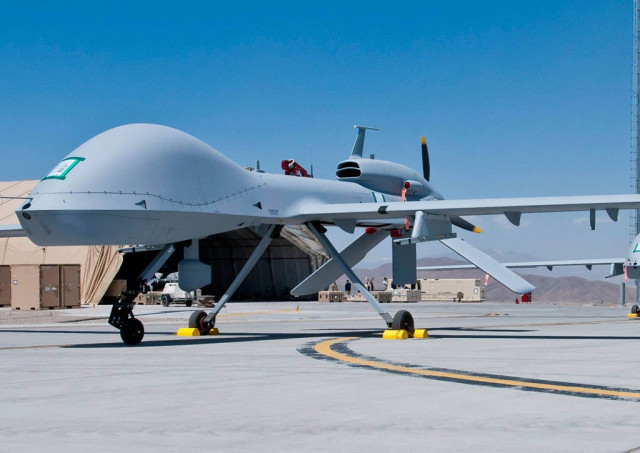High cost of technology: Pakistan condemns North Waziristan drone strike
Foreign office says they will raise the issue of drones in the UN Human Rights Council, Geneva.

File photo of a drone. PHOTO: AFP/FILE
In a formal statement issued by the Ministry of Foreign Affairs and in the subsequent weekly briefing, the Foreign Office spokesperson Tasneem Aslam said that there was an across the board consensus within Pakistan, there was a fast building international consensus against drone strikes, even in the case when the strike is on a high value target.
“Generally the concept is that any technology is not worthy of use if in the process of killing five militants kills one innocent human being. That is the cost of the technology,” Aslam said in the briefing.
The statement, repeated during the briefing, read that "drone strikes are counter-productive, entail loss of innocent civilian lives and have human rights and humanitarian implications. Such strikes also set dangerous precedents in the inter-state relations."
Asked if a high value target was killed in the attack, as others have this year including the assassination of TTP chief Hakimullah Mehsud and a senior Haqqani Network leader, Aslam said that importance of the target does not justify using a flawed method. “Using a method which is fundamentally flawed and illegal even for a positive purpose cannot be justified. Therefore, this is not our policy that if some high value target is killed, we would show leniency against such attacks.”
Having secured international support against drone strikes in a resolution approved in the United Nations General Assembly just days before Wedensday’s strike, Aslam was asked what next could Pakistan do?
“Well , we have repeatedly said that our next step will be tabling a resolution at the Human Rights Council forum in Geneva.”
Ties with US after Afghan exit
Asked about the prospective relationship with the US once interests in Afghanistan end after the 2014 exit, Alsam said that the two War on Terror allies have built up a relationship more than just Afghanistan, which will continue beyond 2014.
“We have bilateral collaboration in economic, energy and other sectors. As discussed last week, there are big energy projects which are on the table for discussion. We have defense collaboration, training programs and exchange of students with the US,” she explained.
“In Afghanistan, we don’t know as yet what would be the shape of US presence and what kind of collaboration Pakistan –US would have. It depends upon the events in Afghanistan and what kind of presence US would have after 2014.”
Positive signs with India
With the Director Generals of Military Operations from Pakistan and India having a face to face meeting earlier this week, Aslam noted that this was a positive step forward.
“They [DGMOs] agreed on the need to maintain peace and tranquility on the Line of Control (LoC) and to stay in touch with each other so that incidents and situations are not allowed to blow up and they are controlled at the local level.”
Asked whether there had been an agreement for joint patrols along the LoC, Aslam neither denied nor confirmed this. “Pakistan and India agreed on a mechanism for travel between the two parts of Kashmir. There are crossing points and the bus service .We do not consider movement of Kashmiris as illegal. But there are smugglers and drug traffickers.”
“Trans-national crimes is an issue and states have to work together to stop that.”
She also welcomed the statement by Indian External Affairs Minister Salman Khurshid which pointed to dialogue as the only way forward.
“It has been our policy all along and this policy has been backed by practical steps by the successive governments in Pakistan that dialogue is the only way forward to resolve the outstanding issues between our two countries. We believe that dialogue and resolution of issues is the only way to create durable peace in this region.”
Kishenganga arbitration
On the Permanent Court of Arbitration award on the Kishenganga hydro electric project, the FO spokesperson distanced herself from the statement of the Minister of Water and Power to claim victory.
“I think it is not the question of claiming victory. I would not say that it was victory for Pakistan or India.”
The spokesperson said that a verdict has been given and that now efforts were needed for its effective implementation.
“We have to now implement it in letter and spirit. In seven years we will see how things work out. I won’t subscribe to this attitude of claiming victory or loss on every issue.”
Prisoners in Indian jails
Asked about Pakistani prisoners in Indian jails, Aslam explained that some prisoners were sentenced on one charge and made to serve the sentence and when that sentence was near completion, the sentence of a different charge starts.
“I know that many Pakistani prisoners are in India who after the completion of sentence in their primary cases are again put in jail and served separate sentences on other grounds.”
She explained that normally sentences are served simultaneously, but in the case of Pakistani prisoners, “after completion of one term, they are again sentenced.”
“That’s why people are languishing in Indian jails for long times. This is a humanitarian issue on both sides because nobody should be punished for a crime longer than what he deserves.”
Aslam explained that the bilateral commission regularly discusses this issue. “We are trying to resolve it.”
New power plant
The spokesperson defended the joint Pakistan-China nuclear power plant in Karachi, explaining that cooperation is exclusively for peaceful purposes and is fully covered under IAEA safeguards.
“The cooperation between Pakistan and China in civilian nuclear programs helps Pakistan in overcoming shortages of electricity and it serves the interest of the Pakistan as you are aware that nuclear energy is a part of our energy mix.”
Aslam further explained that Pakistan has 40 years of experience in maintaining and safeguarding civilian nuclear power plants. “They have been operated with safety and security. Pakistan Nuclear Regulatory Authority (PNRA), an autonomous regulatory body regulates the safety and security of civilian nuclear materials and facilities. It works closely with IAEA and benefits from the recommendations and guidance it receives from the agency.”
The spokesperson pointed out that Pakistan was party to the convention on nuclear safety as well as the two international conventions of early notification and assistance. “We realise that the expansion of nuclear power calls for a higher level of responsibility. We are cognisant of our responsibilities and are fully committed to ensuring safety and security of these power plants that we acquire for nuclear energy. We fully abide by the safeguards of IAEA.”
She alleged that the media campaign against the nuclear plant was being “spearheaded by those who are themselves responsible for spreading nuclear technology outside the NPT and IAEA mandates.”



















COMMENTS
Comments are moderated and generally will be posted if they are on-topic and not abusive.
For more information, please see our Comments FAQ